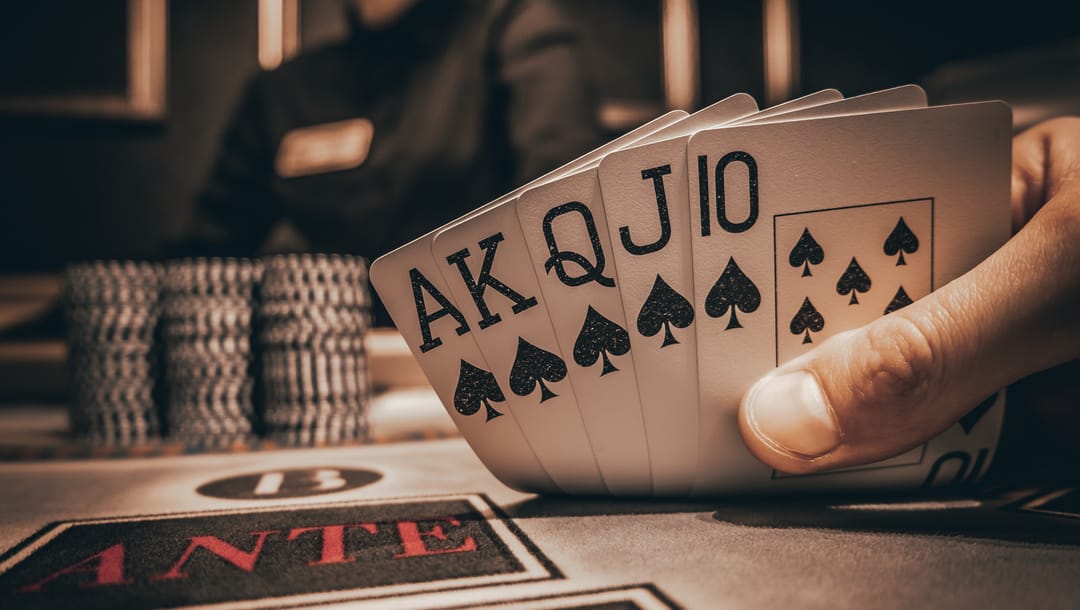If you’re thinking about starting to play online poker or even if you’re relatively new to the game, terms in poker can sound like a whole new language — welcome to the world of funny and confounding poker lingo. To get you started, so you know your “pocket rockets” from your “big slick,” this blog explains many of the terms you’ll come across when playing poker live or online.
Backdoor
When there’s a draw in Texas Hold’em or Omaha poker variants that call for both the turn and river cards (explained further on,) a “backdoor” flush or “backdoor” straight draw means that running cards are needed to complete the draw.
Belly Buster
A “belly buster” is an inside straight draw. For example, if you were holding 7 spades and 10 clubs on 6 diamonds, 8 spades and 4 clubs, you’d have to hit a 9 to make a straight. If the 9 did appear on the turn, the straight would be pretty well disguised and could result in a player “busting” another player.
Boxed Card
The poker term “boxed card” is used to refer to the rare occurrence of a card appearing turned the wrong way in a deck. Most house rules will ignore a boxed card, placing it aside so it isn’t used in the game. That said, different rules apply to cards that are exposed during the deal.
Bad Beat
A “bad beat” is probably one of the most frustrating ways to lose a game of poker. Usually, this occurs when you were significantly ahead in the game, only for your opponent to hit the card they needed and win.
Check Blind
“Check blind” is when players check without looking at their cards, which is why it can also be called “check in the dark.” This term sometimes means that a player out of position checks before the next street is dealt so the action is instantly on their opponent.
Cold Call
A “cold call” usually refers to when a salesperson or consultant makes an unsolicited visit or phone call to try to sell goods or services. In poker, a “cold call” can happen in a multiway pot that involves three or more players. Once a player bets and another raises, if a third player decides to call, they would call cold because they haven’t yet acted on the hand. A “cold call” in poker can also occur preflop when a player opens and another 3-bets, followed by a third player cold-calling the bet and the raise.
Dead Man’s Hand
This is a two-pair poker hand made up of black aces and black eights. It’s called “dead man’s hand” because legend has it that these were four of the cards that were held by Wild Bill Hickok when he was killed in 1876.
Floorman
Never try to wrangle with the “floorman.” This is the official in charge of an online casino cardroom or poker tournament who rules on important hands or incidents.
Gutshot Straight
“Gutshot straight” is also called an “inside straight draw.” This is when players have the middle two cards of a straight as their pocket cards.
What Is a Kicker in Poker?
This is another name for the “high card,” which refers to the cards of a hand that help decide who has the better hand in the case of identical cards.
Nuts
If you have the nuts, it means you’re holding the best possible hand at any point in the game which can’t be beaten. (Some players like to refer to it as the “stone-cold nuts” for extra effect.)
Omaha Poker
This poker variant is the second most popular after Texas Hold’em poker with some well-known professional players opting for the Omaha version of the game. This is because, despite being a challenging form of poker, certain aspects of the game are more controllable than Hold’em (with four hole cards being dealt in Omaha compared to just two in Hold’em.) Nobody seems to know exactly where the variant originated but what is known is that World Series of Poker winner Robert Turner introduced it to a Las Vegas casino and it quickly gained a following. Turner has been vocal about his love of the variant, saying that while you can never be sure in Texas Hold’em if your hand is strong enough, in Omaha poker you know exactly where you stand.
Pocket Rocket Meaning in Poker
“Pocket rockets” refer to two aces. They’re called this not only because they look like two rockets pointing up at the sky, but because they also represent the best possible starting hand in Texas Hold’em.
Rainbow
The poker term “rainbow” or “rainbow board” can be used in two ways. The first is a flop containing three different suits, which means that no flush can be completed on the turn, and the second is a complete five-card board that contains no more than two of any suit so no flush is possible.
Range Balancing
A player’s “range” describes the types of hands your opponent is willing to play. “Range balancing” is all about working out what your opponents’ ranges are and the specific way they play them. This helps you predict their betting behavior and what they may be holding.
River
The river is the name given to the fifth and final community card (also called “fifth street”) that the dealer puts face up on the table in games such as Hold’em. Once revealed, it’s followed by a final round of betting. All players who remain in the hand must show the strength of the cards they hold after the river action has taken place. Some believe that the term was coined on the Mississippi riverboats in the 1800s when the game first became popular in America, having been imported from Europe by traders. It’s said that cheaters, who had deliberately dealt a final community card that would improve their own hand, would sometimes be thrown overboard into the river if discovered.
Shot Clock

Compared to many of the poker terms on our list, “shot clock” is relatively new, having originated quite recently on the high-roller poker tournament circuit. It refers to the practice of giving players a specific amount of time (typically 30 or 60 seconds) to act on their hands. A physical clock on the table counts down the time, and if players fail to act, their hands are declared dead.
Splashing the Pot
This phrase only crops up in live games where you’re playing in person. The phrase describes it exactly as it sounds: when a player basically throws a bunch of mixed casino chips into the pot with the rest of the chips (quite often when they’re going “all in,”) they are said to “splash” and become disorganized. Although this practice is often seen in poker movie scenes, it’s really not cool to do this — it’s highly recommended you avoid this practice if you’re playing in person because the dealer will frown upon it (as will your opponents.)
Texas Hold’Em
You probably would have guessed that the most popular variant in the world, Texas Hold’em poker, was invented a long time ago in Texas. But did you know that it’s called “Hold’em” because players must keep their initial two hole cards throughout a game? This game variant is of the community poker variety, in that all players are dealt five communal, or “community” cards, three of which they can use along with their two hole cards to form their best hand. Because these community cards are delivered sequentially (three as the “flop,” then the turn and river,) with a round of betting in between, it allows for the pot to grow as the action continues.
What Is Tilt?
You never want to go on “tilt,” because that means you’ve allowed your emotions to get the better of you. Consequently, you’re not playing as well as you could if you’d kept a cool head. Some players on “tilt” or who are “tiled” will adopt a looser and more aggressive style, while others will opt for a tight-passive style of play. Either way, your decision-making is likely to be negatively affected when your emotions are out of control — and your opponents will pick up on it and take advantage.
Turn
Sometimes also called “fourth street,” the “turn” is a fourth community card that is burned from the deck and exposed after the flop betting round. At this point, players now have six cards to choose from to make their best five-card hands, with one more round of betting and another card still to be exposed.
What Is an Ace and a King Called in Poker?
An ace-king starting hand is usually referred to as a “big slick” in poker, specifically in Texas hold’em. While the term used to refer to only an ace and a king of the same suit, the term is now used to describe the ace-king starting hand in any suit. Rumor has it that the hand was once called “Santa Barbara” after the 1969 Santa Barbara oil spill and changed over time to “Big Slick.” While this hand can be very profitable if played properly, it is a slippery slope and can quickly turn sideways. For this reason, another common name for this hand is the “Anna Kournikova” after the famous Russian tennis player, because it “looks good, but never wins.”
Do You Really Need To Learn Poker Slang
While knowing poker lingo won’t make you a better player, it can be useful for your gaming experience — especially if you’re a beginner poker player. Getting to grips with commonly used phrases in poker can help you feel more like an insider because you’ll be able to understand what other players are saying and, as a result, enjoy the game a lot more. The same goes for all of the other casino games.
If you’re stepping into the world of casino gaming, depending on which games you choose, knowing the lingo can be extremely beneficial. For example, learning craps terminology as a new player can help you understand how to play the game better and communicate more effectively during gameplay.
If dice games aren’t quite your speed, blackjack is a great game for players who are just starting out. It has the lowest house edge in most casinos and is one of the easiest games to play. Knowing the blackjack terminology can be beneficial to not only your enjoyment and understanding of the game, but it can also help you improve your blackjack etiquette. One instance of this is the blackjack term “color up” which is used to describe when a player has a big stack of low-value chips and asks the dealer to color up and exchange some of them for higher-value chips. Before leaving the table, it is seen as proper blackjack etiquette to color up.
Practice Your Poker Lingo at BetMGM
A great way to practice poker and familiarize yourself with its terms is to register to play poker online at BetMGM. You can get involved in immersive live games or opt into any of the exciting online poker tournaments that are still one of the best ways to learn the game and improve your skills. All the action is right at your fingertips here at BetMGM’s online casino, which also offers a wide variety of the most popular online casino games such as online slots and variety games. You can also look through the wealth of blogs on the website that cover everything you need to know about gambling at both land-based and online casinos, including topics like roulette terminology (and glossaries for other games,) strategy tips, how-to guides and much more.










